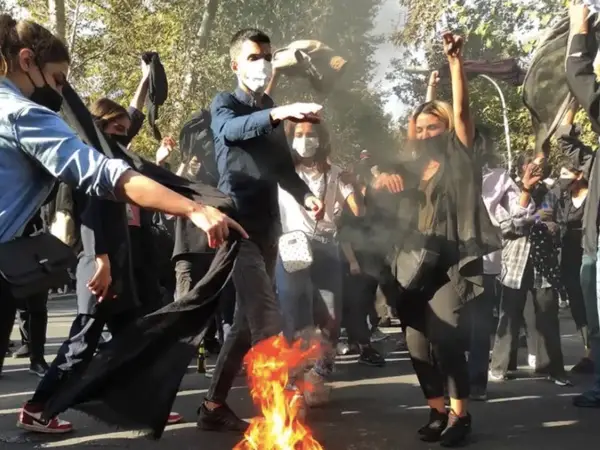Despite all the tactics the Islamic Republic used to keep its seat at the UN women’s commission, the international community dealt another blow over its rights violations.
In its last session of the year, 29 members of the 54-member UN Economic and Social Council (ECOSOC) voted in favor of a US-drafted resolution to "remove with immediate effect the Islamic Republic of Iran from the Commission on the Status of Women (CSW) for the remainder of its 2022-2026 term."
The move was the first time in United Nations history that a country was expelled from the commission, and the second blow to the Islamic Republic over its brutal crackdown on protests sparked by the death of 22-year-old Mahsa Amini in custody of hijab police. The first step to hold the Islamic Republic accountable was creating a fact-finding mission by the Human Rights Council. The Geneva-based UN Human Rights Council voted on November 24 to launch an independent investigation into the regime’s deadly repression that has killed around 500 civilians, including about 60 children.
Iran had tried its best to keep itself part of the commission through rallying its allies and a behind-the-scenes campaign to exert pressure on academic figures to send letters to numerous global bodies to urge them vote against the move. However, the result of was not unexpected as the regime’s membership in the commission was repeatedly condemned even before the current wave of protests.
During the Wednesday session, the Islamic Republic and its friends, including China and Russia, argued that the expulsion of Iran sets a precedent that may be used against other members in the future. As usual, Tehran’s main strategy was not to address the problem directly but instead accuse other countries of human rights violations.
Another strategy of the pro-Tehran camp was to count on countries that have grievances against the US. Iran's UN Ambassador Amir Saeid Iravani called the move illegal, describing the United States as a bully. "The US request is entirely illegal, as the Council members are fully aware that there is no precedent in the council practice of terminating an elected member's participation in a functional commission for any other reason,” Iravani said.
The Russian envoy also tried to make the best use of UN technicalities to stop the vote, asking for a legal review of the draft, but Moscow’s motion was annulled by a quick vote before the main decision.
China's Deputy UN Ambassador Geng Shuang said, "Addressing human rights and women's issues by means of removing Iran from CSW would only set a dangerous precedent, send out the wrong message and bring about negative consequences."
The countries in favor of expelling Iran from the CSW were of the opinion that its membership would be a stain on the name of the commission as the principal global intergovernmental body exclusively dedicated to the promotion of gender equality and the empowerment of women. The text of the draft resolution denounced Iran's policies as "flagrantly contrary to the human rights of women and girls and to the mandate of the Commission on the Status of Women."
Referring to the Iranian protesters, US Ambassador to the UN, Linda Thomas-Greenfield, told ECOSOC that "These women and activists have appealed to us, the United Nations, for support. They made their requests to us loud and clear -- remove Iran from the Commission on the Status of Women.”
She argued that it cannot do its important work “if it's being undermined from within. Iran's membership at this moment is an ugly stain on the commission's credibility.” She noted, “There are few, obviously, right and wrong answers in diplomacy. But today, today we have an opportunity to do something that is clearly the right thing to do. We can act in this moment to support women. We can act in direct response to our constituents, the global community of women.”
The move has been welcomed by many Western countries, many Iranians and activists. In a statement after the vote, US National Security Advisor Jake Sullivan described it as yet “another sign of the growing international consensus on Iran and demands for accountability.”
“Over the last week alone, the United States has issued three separate sets of sanctions targeting Iran’s financing of terror, protest-related human rights violations, and provision of UAVs to Russia for attacks against Ukraine’s critical infrastructure. We have acted in coordination with the EU, UK, Canada, Australia, and others who have issued new sanctions under their own authorities," read the statement.
Israeli Prime Minister Yair Lapid also praised the decision, saying, "Iran's killing of Mahsa Amini and its blatant violations of women's rights disqualify it from being a member of a committee that deals with women's rights.”
Canada-based activist Hamed Esmaeilion, whose daughter and wife were killed by the IRGC, also hailed the action, calling the regime authorities “the enemies of women, life and freedom.”
Former Donald Trump State Department spokesperson Morgan Ortagus tweeted, “Victory! The Iranian regime has been kicked off the UN Women’s Commission! At last, a small but important measure of accountability against the Islamic Republic of Iran for their gender apartheid and crimes against women."
Iranians in several cities, including the capital Tehran and in the Kurdish city of Saqqez, the hometown of Mahsa Amini, poured out onto streets celebrating the decision. Most of them see this as a victory because it may lead to more international measures, or at least make the regime retreat from its iron-fisted crackdown.
